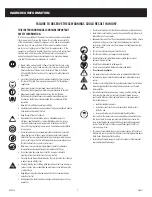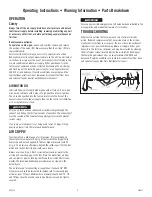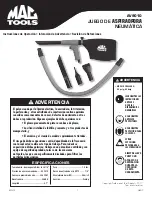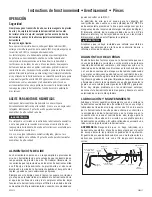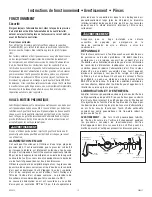
AV9010
4 060817
OPERATION
Safety
Always turn off the air supply, drain hose of air pressure and detach
tool from air supply before installing, removing or adjusting any part
or accessory on this tool, or before performing any maintenance on
this tool.
Do not vacuum any liquids.
To operate as a blow gun,
remove end cap (#4), remove and reverse
the position of the valve (#3). Always ensure that the o-rings (#2) are
replaced properly.
Factors outside the tool may cause loss of power or erratic action.
Reduced compressor output, excessive drain on the air line, moisture or
restrictions in air pipes or the use of hose connections of improper size
or poor condition may reduce air supply. Grit or gum deposits in the
tool may cut power and may be corrected by cleaning the air strainer
and flushing out the tool with gum solvent oil or an equal mixture of
SAE #10 oil and kerosene. If outside conditions are in order and the
tool continues erratic action or low power, disconnect tool from hose
and take tool to your nearest authorized service center.
AIR MOTOR OIL
Lubricate the air motor daily with high quality air tool oil. If no in-line
oiler isused, lubricate with 5 drops of high quality air tool oil per day.
The oil can be squirted into the tool air inlet or into the hose at the
nearest connection to the air supply, then run the tool. A rust inhibitive
oil is acceptable for air tools.
After an air tool has been lubricated, oil will discharge through the
exhaust port during the first few seconds of operation. The exhaust port
must be covered with a towel before applying air pressure to prevent
serious injury.
If an in-line air lubricator is not being used, inject 10 drops of high
quality air tool oil into the inlet each day before use.
AIR SUPPLY
Tools operate on a wide range of air pressures. It is recommended
that air pressure measures 90 psig at the tool with the trigger fully
depressed and no load applied to the tool. Higher pressure (over 90
psig; 6.2 bar) raises performance beyond the rated capacity of the tool,
which will shorten tool life and could cause injury.
Always use clean, dry air. Dust, corrosive fumes and/or water in the
air line will cause damage to the tool. Drain the water from air lines
and compressor prior to running tool. Clean the air inlet filter screen
weekly. The recommended hookup procedure can be viewed in the
below figure.
The air inlet used for connecting air supply has standard 1/4" NPT.
Line pressure should be increased to compensate for unusually long
air hoses (over 25 feet). Minimum hose diameter should be 5/16" I.D.
and fittings should have the same inside dimensions and be tightly
secured.
Ensure an accessible emergency shut off valve has been installed in the
air supply line and make others aware of its location.
TROUBLESHOOTING
Other factors outside the tool may cause loss of power or erratic
action. Reduced compressor output, excessive drain on the air line,
moisture or restrictions in air pipes or the use of hose connections of
improper size or poor conditions may reduce air supply. Grit or gum
deposits in the tool may cut power and may be corrected by cleaning
the air strainer screen (located indside the air inlet) by flushing out
the tool with gum solvent oil or an equal mixture of SAE #10 and
kerosene. If outside conditions are in order, disconnect tool from hose
and take tool to your Mac Tools Distributor for repair.
Operating Instructions • Warning Information • Parts Breakdown
WARNING
WARNING


